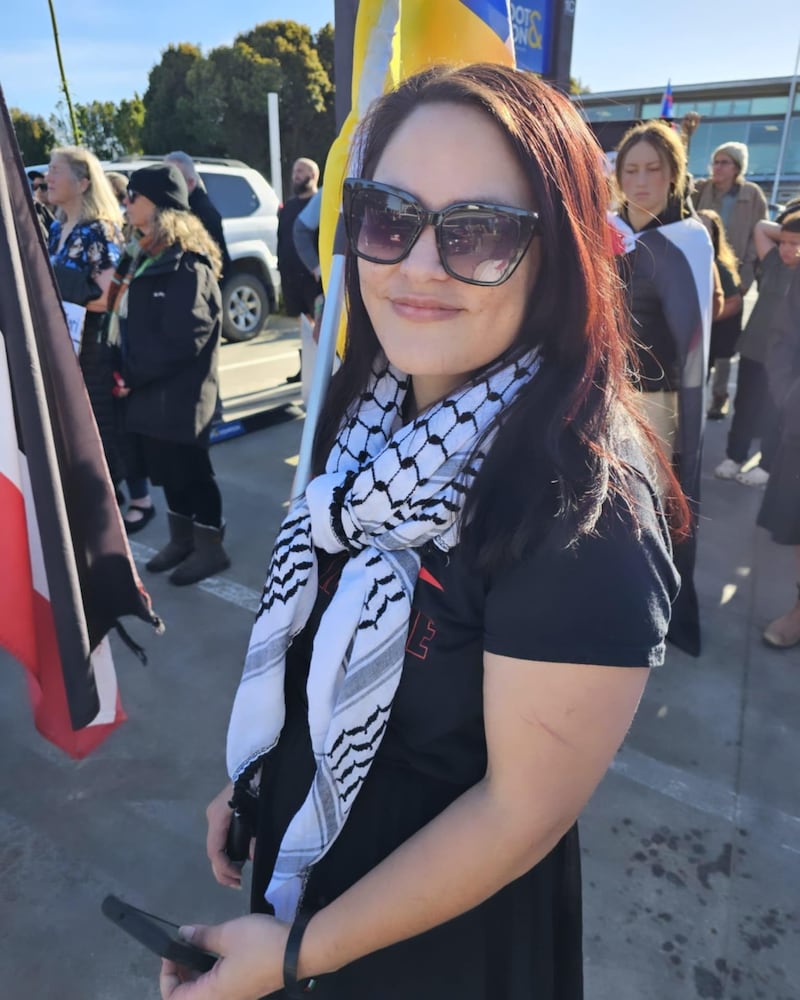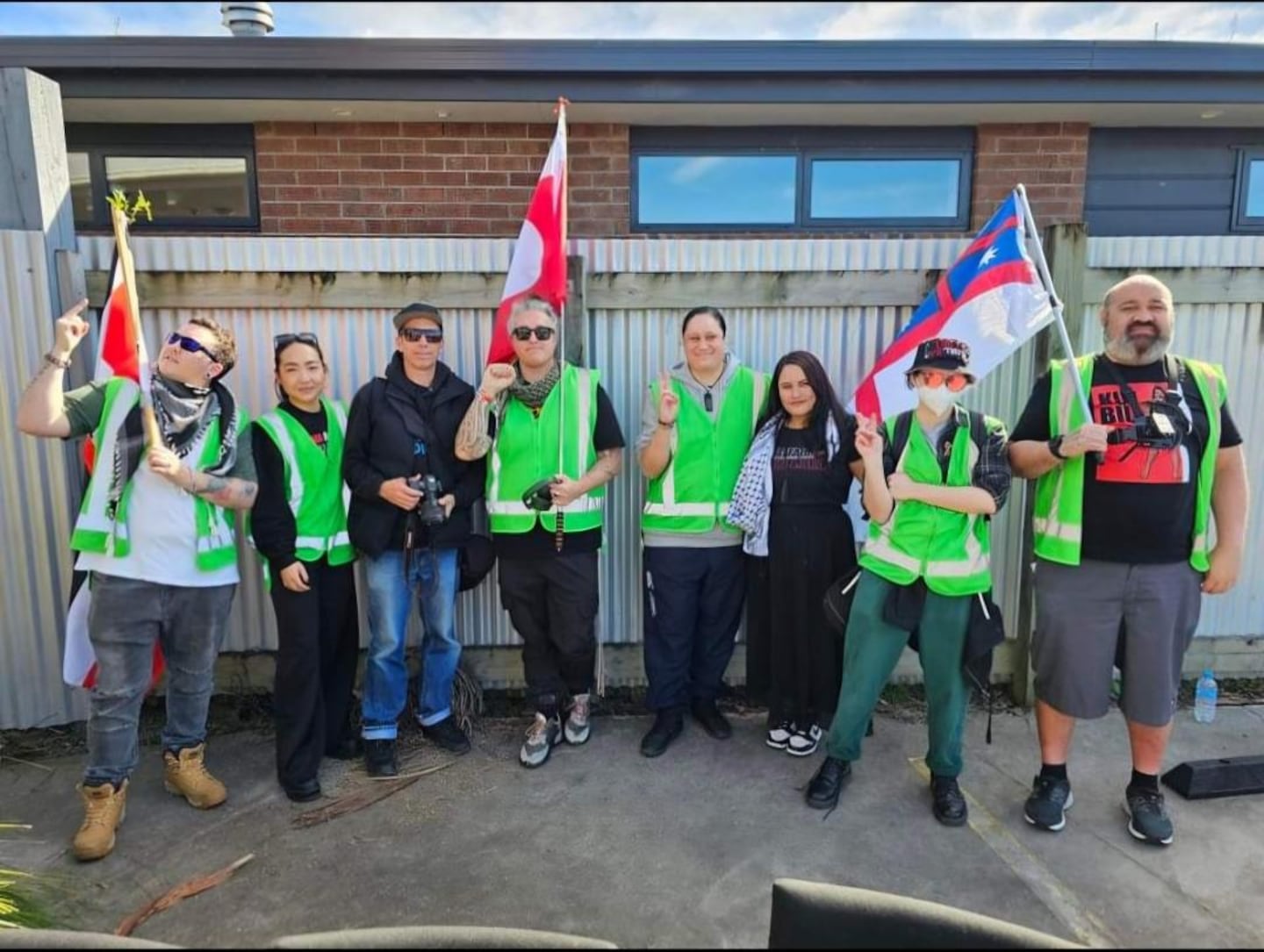Mīharo Edwards’ face and pukana were broadcast on TV and social media yesterday as the unnamed protestor who disrupted the Kaipara District Council meeting with her haka.
The council later voted to disestablish the Māori wards.
But Edwards, who came to the rescue of a councillor who fainted after the meeting, says she is disappointed by the media coverage labelling her as a protestor.
She believes it fed into the “angry brown woman” stereotype for clickbait. “I have a name,” she says.
The only media who asked for her name was a Pākehā man from NZME who came up to her to ask for her name and iwi but it wasn’t used.
“But for our own media to fall into that. Couldn’t you have put imagery of the beautiful waiata coming from our tamariki? You played into their cards all for what? Clickbait? Wāhine aren’t on the front lines for clicks.”
Edwards (Ngāti Whātua ki Kaipara, Te Taoū) says she is feeling frustrated by the council decision because the decision will mean the continued displacement and poverty for her people.

Edwards says the meeting was meant to be public although there weren’t enough seats and, with the council closing the blinds to block the group outside, it symbolised “you don’t matter”.
When Māori ward councillor Pera Paniora opened the door to outside, she was doing her mihi to the iwi and Edwards saw it as a signal because she could see the heaviness in the room.
“The instincts just kicked in and I felt like I needed to be there and support her. As a Kaipara wahine I wanted to be there like ‘I’m here, you’re not carrying this alone’,” Edwards said.
“What got me feeling like I needed to be there with her was the fact they were just trying to shut her down from acknowledging her people, her iwi who were there to support her.”
The councillor who fainted
After the meeting one of the councillors fainted in the carpark.
Otamatea councillor Ron Manderson fainted and Edwards immediately went to help, due to her experience as a live-in caregiver for her disabled mother who has epilepsy and cerebral palsy.
Initially, she says she called out to the police to call an ambulance but she says they stared, ignored her and moved with no urgency until they could see what was happening.
Edwards says deputy mayor Jonathan Larsen tried to block her from offering help but she found a chair and lifted Manderson onto it herself.
A cameraman stood there recording Manderson and Edwards told him, “Is that appropriate while he’s suffering from a medical event? Move your camera.
“So here I am assisting both these men who ultimately voted against my people,” she said.
“This attack on us, no matter what, we’re always going to pull through with manaakitanga.”
Edwards said the iwi marae are listed as civil defence centres and, with Paniora as Māori ward councillor, she’s able to mobilise Kaipara marae to assist everyone in Kaipara and she proved that in her response to Cyclone Gabrielle.
“I feel like the Kaipara District Council has just shot itself in the foot here.”
Voting in Kaipara Māori electorate
The Kaipara district is predominantly Pākehā and Edwards said most Māori including her own whānau live away from home.
Māori in the area were impacted by land confiscations and urbanisation to cities due to land loss and poverty.
“All those landowners, illegal land owners, get to decide who they put in positions of power. This is why we need an iwi rep inside so our voices are heard,” she says.
While Edwards is anti Pākehā systems and doesn’t agree with the Crown, she believes for now, “there is power in voting in your own people and it can help the collective wellbeing and ensure their voices are being heard”.
“If we don’t vote, they can continue to weaponise democracy against us.”
Edwards is a Kāinga Ora tenant and has applied to transfer closer to home to be in the Kaipara district so her voice can be heard and so there is a paper trail.
Right now, she said she doesn’t think they’re listening to Māori voices or are actively ignoring them.
Tangata tiriti support
The highlight for Edwards was travelling with tangata tiriti who answered her call when he posted online saying: “If I met you at your front line, please meet me at mine”.
As Edwards is an activist in the community and attends many different events in solidarity with other oppressed groups, she was asking for the same support.
She says she tries to push the communities she works in to walk the talk and instead of just saying “we acknowledge” mana whenua at the start of an event actually putting in the effort to support the mana whenua.
And they did. She was taken aback by the manaakitanga for iwi as the day got hot fast because of the chanting and she said the few tangata tiriti who showed up brought trays of water and got seats for kaumātua.
“So far the tāngata tiriti whānau I’ve been working with on the front lines supporting Palestine have come with me to Hui-ā-Motu, to Waitangi, and now back home.”
She says she’s grateful for this relationship, which has shown support for mana whenua and te tiriti partnership on a grassroots level.
“Because te Tiriti is under attack right now, tangata Tiriti really need to be loud about how they’re not afraid of te Tiriti.”
She says it’s as simple as picking up a tea towel to support local marae.



